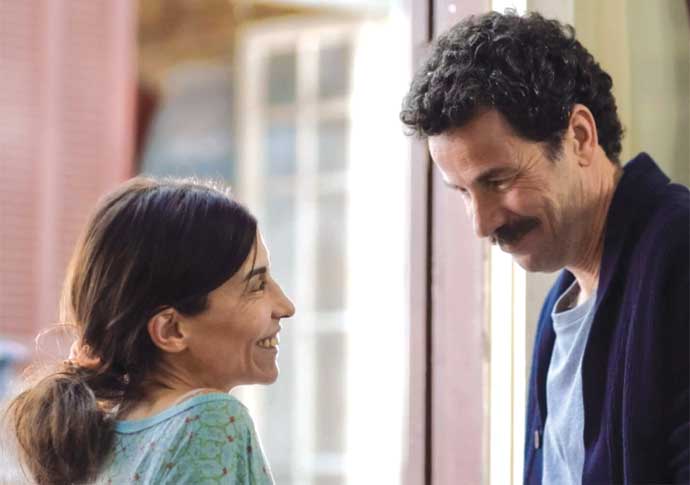The Blue Caftan: moving story of a loving couple and the secret they share
Clever, beautiful, tragic film considers how good people face life-suffocating choices because of others’ issues
Thursday, 27th April 2023 — By Dan Carrier

Lubna Azabal and Saleh Bakri in The Blue Caftan
THE BLUE CAFTAN
Directed by Maryam Touzani
Certificate: PG
☆☆☆☆
FROM the call to prayer to the tinkling of black tea being poured in to a glass, Maryam Touzani’s Moroccan-set drama is drenched in atmosphere.
Her dramatic story of a loving couple with a secret they share is wonderfully acted and well told – with an added sense of high-art film-making by Touzani’s superb use of light, colour and location.
This is both a sad and beautiful film to watch.
Mina (Lubna Azabel) and Halim (Saleh Bakri) run a Kaftan store and tailor’s shop in the heart of a medina. We find them at work, surrounded by reams of cloths and silks, the threads and lace, and sticking together as customers come in with their demands.
In this atmosphere of craft, we learn they do not have a sewing machine but work by hand.
When one woman complains that it is pointless and no one can tell the difference any more, it is yet another reminder that their cosy existence is under pressure from forces way beyond their control.
And the same goes for their relationship. Halim is gay, and has kept his sexuality hidden. His wife knows, and they have a close and loving relationship.
When Youssef (Ayoub Missioui) joins as an apprentice – polite, quiet, clean – he appears to be perfect. But Mina, at first, has her doubts – she senses the relationship developing between her husband and the young man, and this prompts searching answers as to how to balance conflicting emotions tied up in love and societal expectations.
As well as a moving love story, at its heart is the idea of what freedom means. Is it the right to choose your own way, your own moral code? Is it the government’s place to dictate what you can and can’t do? How does it square, if you are doing no one else harm, to be made an outlaw?
This clever, beautiful, tragic film considers how good people face life-suffocating choices because of others’ issues, traditions and prejudice.
Touzani was born in Algiers and studied in London before returning to Morocco. She has a background in documentary, and that comes over as she produces a drama with sharp political and social commentary.
This piece of north African social realism is her first full-length feature. Touzani is a film-maker with plenty to say and has a brilliant way of saying it. Her next project is eagerly awaited.